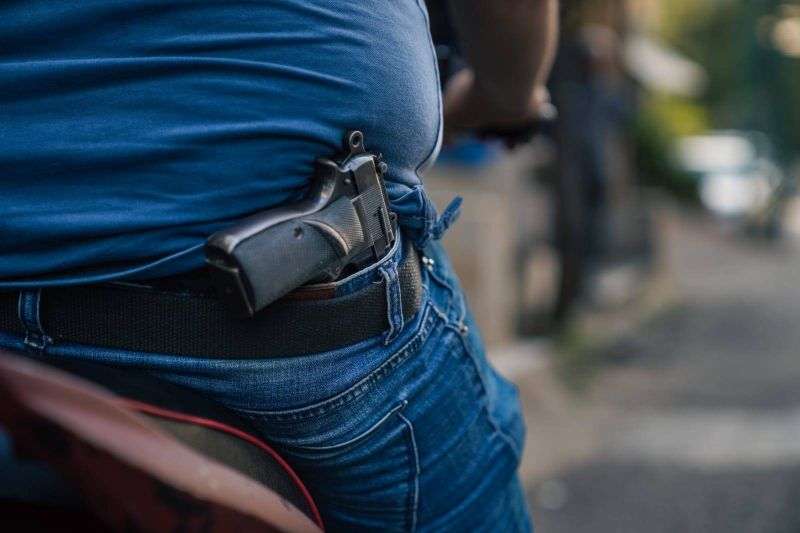
Many Lebanese have developed the habit of keeping their savings at home, which has benefited both the personal security sector and the opaque, unregulated arms market. (Credit: Mohammad Yassine/L'Orient-Le Jour)
Ali*, 30, was busy cleaning dozens of weapons before him. “There’s hardly anyone left who doesn’t have at least one at home,” said this small-time firearms dealer in Beirut.
Indeed, firearms sales to individuals have skyrocketed since the onset of the economic and financial crisis in Lebanon in 2019.
With the illegal restrictions banks have imposed on depositors since the start of the crisis, many Lebanese have been keeping their savings at home, amid an overall rise in petty crime.
This situation has benefited the personal safety sector and the opaque, unregulated arms trade, although such products are pricey. The price of well-known pistols and revolvers brands can range between $1,000 and $4,000, while those made in Ukraine or Turkey are sold at $200 to $500 and account for the bulk of sales, the dealers interviewed said.
“The crisis has been a financial windfall for me,” said Abou al-Wafa*, another trafficker operating in Mount Lebanon, who uses this alias among his customers. “Before [the crisis] I used to deliver food. Now I deliver guns!” he said.
Just like him, many others have been able to join this sector easily. This is because buying and selling weapons is largely unregulated in Lebanon, recalled a security source on condition of anonymity.
The only arms dealers who operate legally sell hunting rifles and ammunition to those who hold permits issued by the High Council for Hunting. Apart from them, and members of the security forces, any Lebanese citizen wishing to own a light or small weapon must obtain a permit from the Defense Ministry. This permit is granted for one year and is renewable under certain strict legal conditions, including a clean criminal record, the security source said.
Daniele Yacoub, an attorney at the Criminal Court, told L’Orient-Le Jour that there are two types of permits issued at the minister’s discretion. The first is linked to a specific weapon (and identified by its serial number), and the other to any type of weapon. The holder of this second permit can practically acquire as many weapons as he or she wishes, and of different specifications.
L’Orient-Le Jour reached out to the Ministry for comment but to no avail. The source estimated that tens of thousands of permits are in force in the country this year, and added that a large number of illegal weapons are in circulation in the hands of Lebanese and non-Lebanese alike.
According to the testimonies gathered, this “gray” market is currently divided between big dealers in the Bekaa Valley, Mount Lebanon, Tripoli and Beirut, who supply their neighborhood “branches” with pistols, Kalashnikovs and ammunition.
Much of this merchandise is smuggled from Jordan, Serbia and Turkey through Syria, said the merchants. One indicated that many members who deserted the security forces during the crisis got rid of their service weapons to make some money.
Ziad*, who would not give his name or specify in which security service he used to work, is one of them. “Dozens of service weapons are today in the citizens’ hands.”
Two million weapons?
The bulk of this trade takes place under the state’s radar, and there are no figures on the number of small firearms weapons currently in the citizens’ hands.
However, according to the Small Army Survey website, which tracks arms ownership by country, there are no fewer than 2 million weapons in the hands of individuals in Lebanon, which is the equivalent of almost a third of the population. “Lebanon, though financially poor, is rich in weapons,” said the site.
However, being arrested by the police for possessing an unlicensed weapon makes the person liable to prosecution before the military court. “This is an offense, and the weapon is generally seized and the owner fined,” said Yacoub. “On the other hand, if the weapon is used, regardless of the crime committed, a conviction for possession of an illegal weapon would be added to the initial conviction,” she added.
The uncontrolled circulation of these firearms is gradually becoming a major security issue in a country plagued by public services’ collapse, the existence of “lawless” areas linked to serious crime and a climate of impunity.
Moreover, the rapid growth of this market is likely to increase the number of accidental deaths, particularly those caused by “stray bullets” fired into the air in celebration. “Many new users lack the know-how when it comes to firearms,” said Fady*, who added he has often had to brief his occasional customers about that.
A security source who declined to be named said these precautions are insufficient.
*First names have been changed.
This article was originally published in L'Orient-Le Jour. Translated by Joelle El Khoury.

